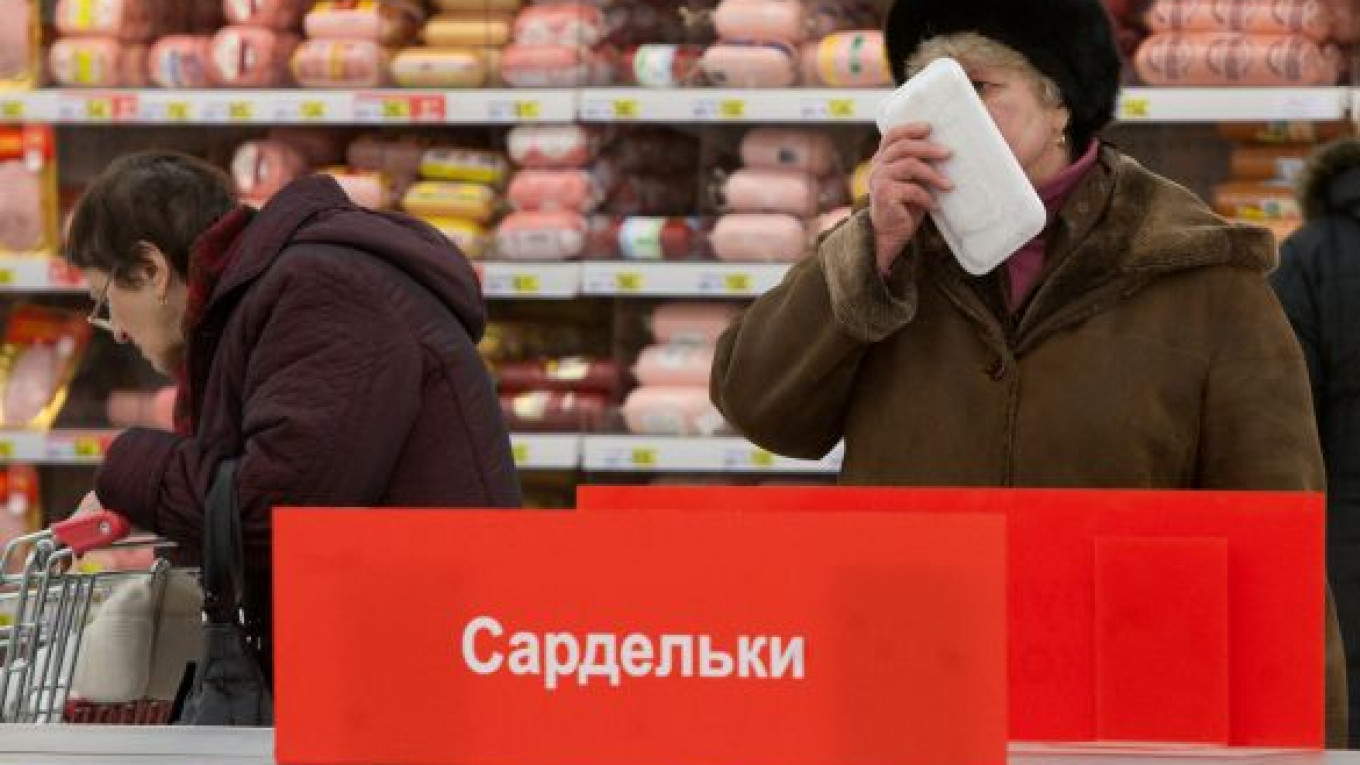Potatoes, eggs and caviar are among the food products that have seen double digit price growth in 2013, according to information released by the State Statistics Service on Wednesday.
The statistics service expects food price inflation to average 7.5 percent across the country in 2013, which is similar to last year's rate. However, the Public Chamber, an elected citizen group that aims to influence state policies, forecasts an average increase of 11 percent, leapfrogging any income growth that consumers might be able to hope for in a stagnant economy.
Russia's accession to the World Trade Organization last year, growing costs of fuel and animal feed, and a lack of competition among suppliers in some regions are credited for the rapid price increases.
"I want to congratulate you all on a year and one month since Russia has acceded to the WTO," said Alexander Chernov, secretary of the agriculture working group in the Public Chamber.
"Did the WTO lead to a doubling of prices? Probably not, but a year has passed and what do we see? We see that despite it being the season when historically we have not seen exuberant price growth, prices are rising. And it is not about to stop," Chernov said.
The cost of potatoes has risen 30 percent this year to an average 21.1 rubles per kilogram, said Svetlana Ulanova, deputy head of the prices office at the State Statistics Service. Caviar lovers now have to pay 22 percent more for the delicacy than in 2012 and anyone using onions in their cuisine is paying 21.6 percent more on average.
The price of eggs has grown by 16 percent over the year, but from August to October they were 25 percent more expensive than at the beginning of 2013. Ten eggs now cost 50 rubles on average.
"Eggs will soon be worth gold," Ulanova said.
Complaints from residents of the Stavropol, Lipetsk and Ulyanovsk regions has prompted the Federal Anti-Monopoly Service to investigate whether egg suppliers conspired over prices, though the Russian Poultry Union earlier commented that prices have risen because bird feed has become more expensive.
"There are no objective reasons for uncontrolled food price inflation in Russia," said Irina Yepifanova, deputy head of the agricultural complex office at the Anti-Monopoly Service.
However, Chernov forecasted that food prices will rise by 11 percent this year and said that the cost of potatoes has more than doubled in 2013, as compared to the 30 percent figure from the State Statistics Service.
Moscow usually experiences price inflation that is close to the national average because there are multiple suppliers on the market and the logistics of distribution focuses on the capital, statisticians said.
Meanwhile, the Far East continues to be the most expensive area in terms of the cost of food. For example, potatoes there are five times more expensive than the countrywide average.
Prices are higher because of lower competition, Ulanova and Yepifanova said. The effect on prices of the floods that ravaged the area this summer were minimal because there were strict government measures to prevent this from happening.
Contact the author at [email protected]
A Message from The Moscow Times:
Dear readers,
We are facing unprecedented challenges. Russia's Prosecutor General's Office has designated The Moscow Times as an "undesirable" organization, criminalizing our work and putting our staff at risk of prosecution. This follows our earlier unjust labeling as a "foreign agent."
These actions are direct attempts to silence independent journalism in Russia. The authorities claim our work "discredits the decisions of the Russian leadership." We see things differently: we strive to provide accurate, unbiased reporting on Russia.
We, the journalists of The Moscow Times, refuse to be silenced. But to continue our work, we need your help.
Your support, no matter how small, makes a world of difference. If you can, please support us monthly starting from just $2. It's quick to set up, and every contribution makes a significant impact.
By supporting The Moscow Times, you're defending open, independent journalism in the face of repression. Thank you for standing with us.
Remind me later.






